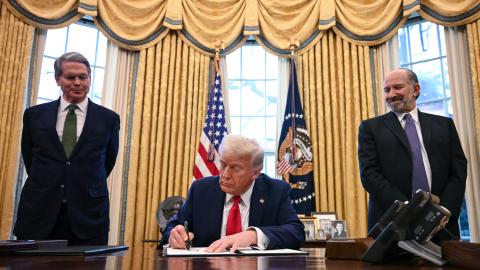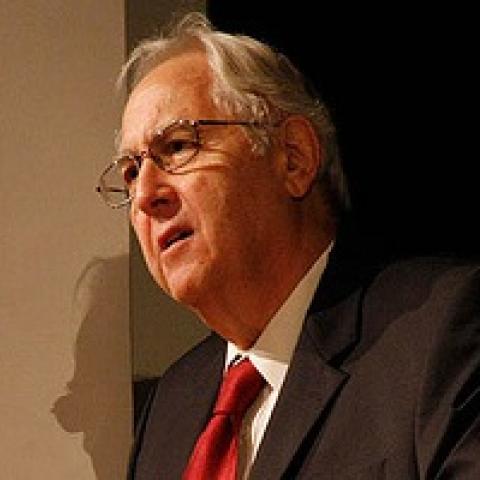The left in America continues to argue that Obama is too far to the right. They believe they need a strong left-wing people's movement that will organize and force Obama to the real left, just as the CIO forced FDR to initiate the so-called Second New Deal and pass scores of new laws including Social Security and the Wagner Labor Relations Act. Big Labor also persuaded Roosevelt to undertake the beginning of a shift to something approximating an American social-democracy.
The other analogy, one E.J. Dionne makes in a Washington Post column, is to the civil rights movement of the 1960s, which pushed Lyndon B. Johnson to favor and introduce a civil rights bill that would give African-Americans long-delayed legal equality all through the country. As LBJ said in his speech to the nation, using the very words of the movement as his own, "We shall overcome."
So E.J. Dionne asks: "Why hasn't there been a tea party on the left? And can President Obama and the American left develop a functional relationship?" His answer is that they must, if Obama is to be the man his supporters thought he was in 2008. He is somewhat jealous, since he writes: "The entire political agenda has shifted far to the right because the tea party and extremely conservative ideas have earned so much attention."
What he really means is not that the Tea Party gets attention, but that it has managed to mobilize the populace against the very dangerous Obama policies that have wreaked havoc on the economy. Indeed, whatever attention these conservative ideas have received comes in the form of endless attacks on them from the MSM, whose practitioners are committed to liberal shibboleths, and as Ronald Reagan once quipped, "liberals will fight to the death to defend the right of people to agree with them."
What Dionne complains about is something else: namely, that when Obama won, the Left stopped mobilizing, thinking that all their problems were over, and they took at Obama's word that he would soon begin the "fundamental transformation of America" that he had promised.
Dionne acknowledges that Democrats controlled both houses of Congress. But he fails to ask since that was the case, why could he not get through the type of legislation he says now is not possible because Republicans control the House? Dionne also says Obama only pretended to be a left-winger; something he could pull off because there was no organized real Left to show that he was not. In his eyes, he only wanted the Left as a force to support his rather mild and cautious semi-reforms, such as ObamaCare.
Thus Dionne treats ObamaCare as a half-measure, which if one compares it to British old-style socialized medicine or total single-payer system favored by the Left, it certainly is. But of course, most Americans have read serious conservative critiques of the existing Obama health care legislation, and know full well that it will completely ruin the health care system we have, drive the price of health care up, and make it less accessible for everyone. And like Paul Krugman, he argues that the problem with the stimulus was not that it could not work and actually made things worse, but that it was not large enough!
So here is Mr. Dionne's solution to the problem:
This week, progressives will highlight a new effort to pursue the road not taken at a conference convened by the Campaign for America's Future that opens Monday. It is a cooperative venture with a large number of other organizations, notably the American Dream Movement led by Van Jones, a former Obama administration official who wants to show the country what a truly progressive agenda around jobs, health care and equality would look like. Jones freely acknowledges that "we can learn many important lessons from the recent achievements of the libertarian, populist right," and says of the progressive left: "This is our 'tea party' moment — in a positive sense."
Once again, the highly touted left-wing Tea Party run by the avowed Marxist-Leninist Van Jones. Jones seems to have succeeded in getting away with his strategy of giving up open avowal of his revolutionary beliefs to achieve the same goals by using the old Leninist strategy of "boring from within," favored by the sectarian Left in the 1920's and early 1930's.
If they succeed, Dionne writes, it will have the following effect:
What's been missing in the Obama presidency is the productive interaction with outside groups that Franklin Roosevelt enjoyed with the labor movement and Lyndon B. Johnson with the civil rights movement. Both pushed FDR and LBJ in more progressive directions while also lending them support against their conservative adversaries.
This is the old dream of a "people's movement" of the far Left that can exert the kind of pressure Obama cannot resist. After all, if he does not follow their lead, their cadre will not come out the weeks before the election, going door to door in swing states or contested regions — as they did in Virginia in 2008 — leaving the independents and the old Reagan Democrats to continue to move toward a decision to vote Republican.
The problem is that if Barack Obama takes the bait, it will only increase the decision of these swing voters, independents and working-class whites to move even faster towards the Republican candidate. In West Virginia, the results have just come in. The Democratic candidate Earl Ray Tomblin managed to squeak by with a very slim margin of victory of just 3 per cent, in a state in which the Democrats have always won the Gubernatorial spot by large margins.
The New York Times reported:
It was a slim victory in a hard-fought race that was seen as a test for Democrats. Mr. Maloney, a businessman, was initially viewed as a long-shot in this heavily Democratic state, but he surged ahead in the polls in recent weeks with the help of negative advertisements associating Mr. Tomblin with Mr. Obama, who is deeply unpopular here. Mr. Tomblin's campaign also ran negative ads.
This was the case even though Tomblin is considered a conservative Democrat, who was endorsed by the NRA, favors coal mining, and is continuing the state's lawsuit against the Environmental Protection Agency. Yet, so unpopular is Obama, that Tomblin almost lost!
You can be certain that Barack Obama will look closely at these results, and therefore, think hard and fast before making the shift to the left to please Van Jones and company. As the Times put it, "Mr. Obama was another liability, and Mr. Tomblin worked hard to distance himself. "
Hence President Obama's quandary: Shift Left and get the base out, but lose the swing states, independents and working-class Democrats. Or shift Right and lose the organizing activity, endorsement and support of the left-wing activists.
Either course spells one outcome that will be good for the country: Barack Obama will be a one-term President.

















